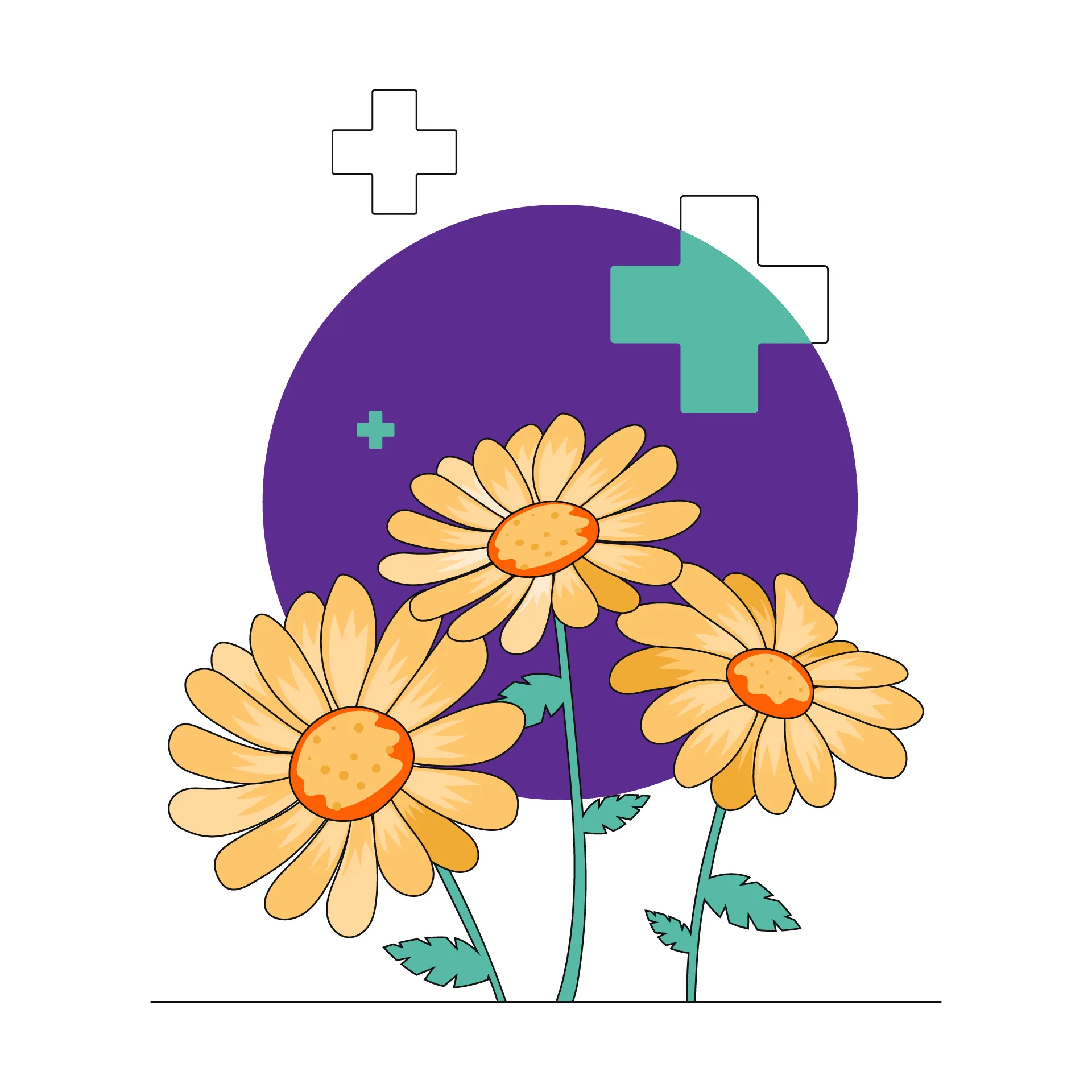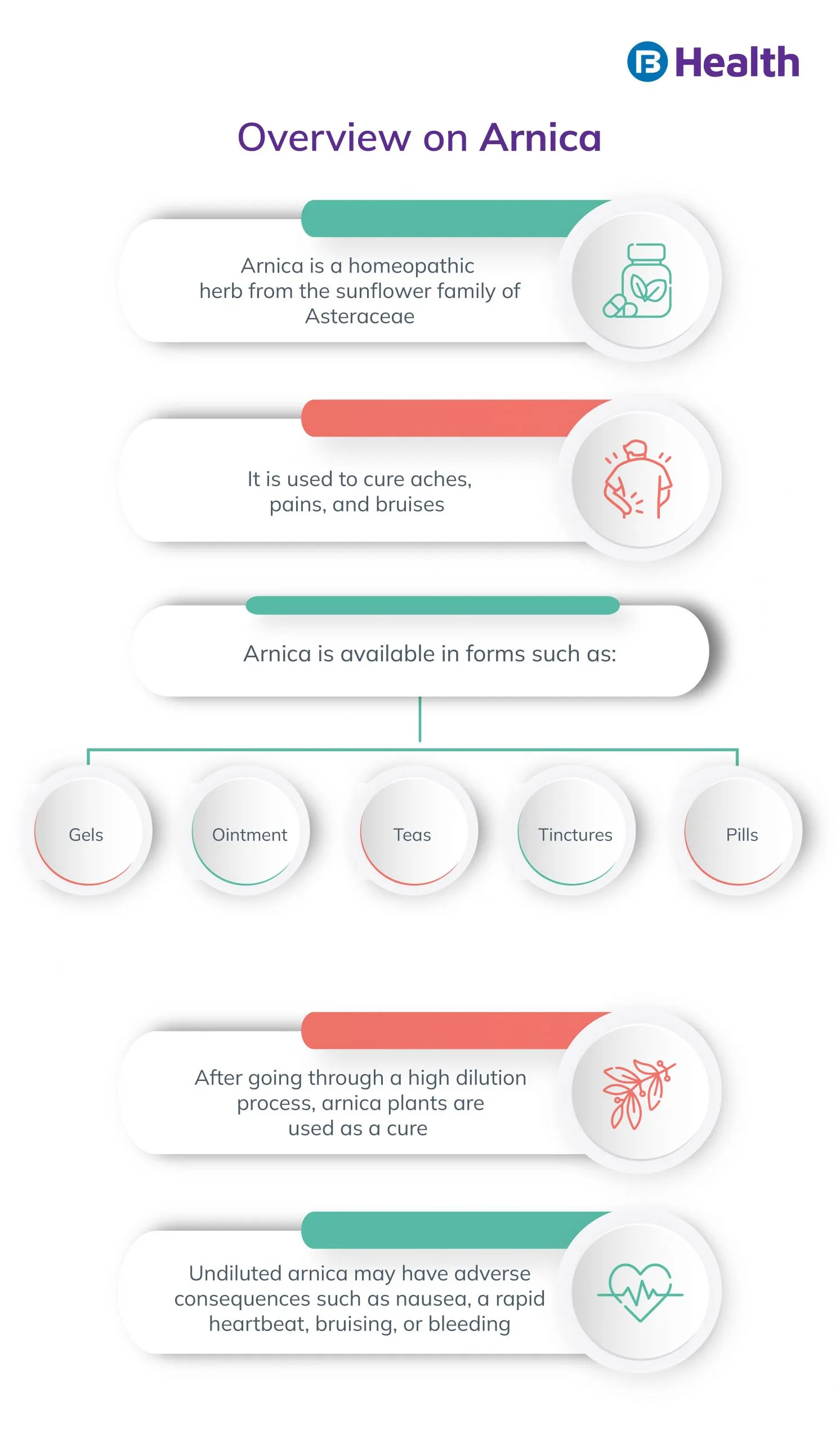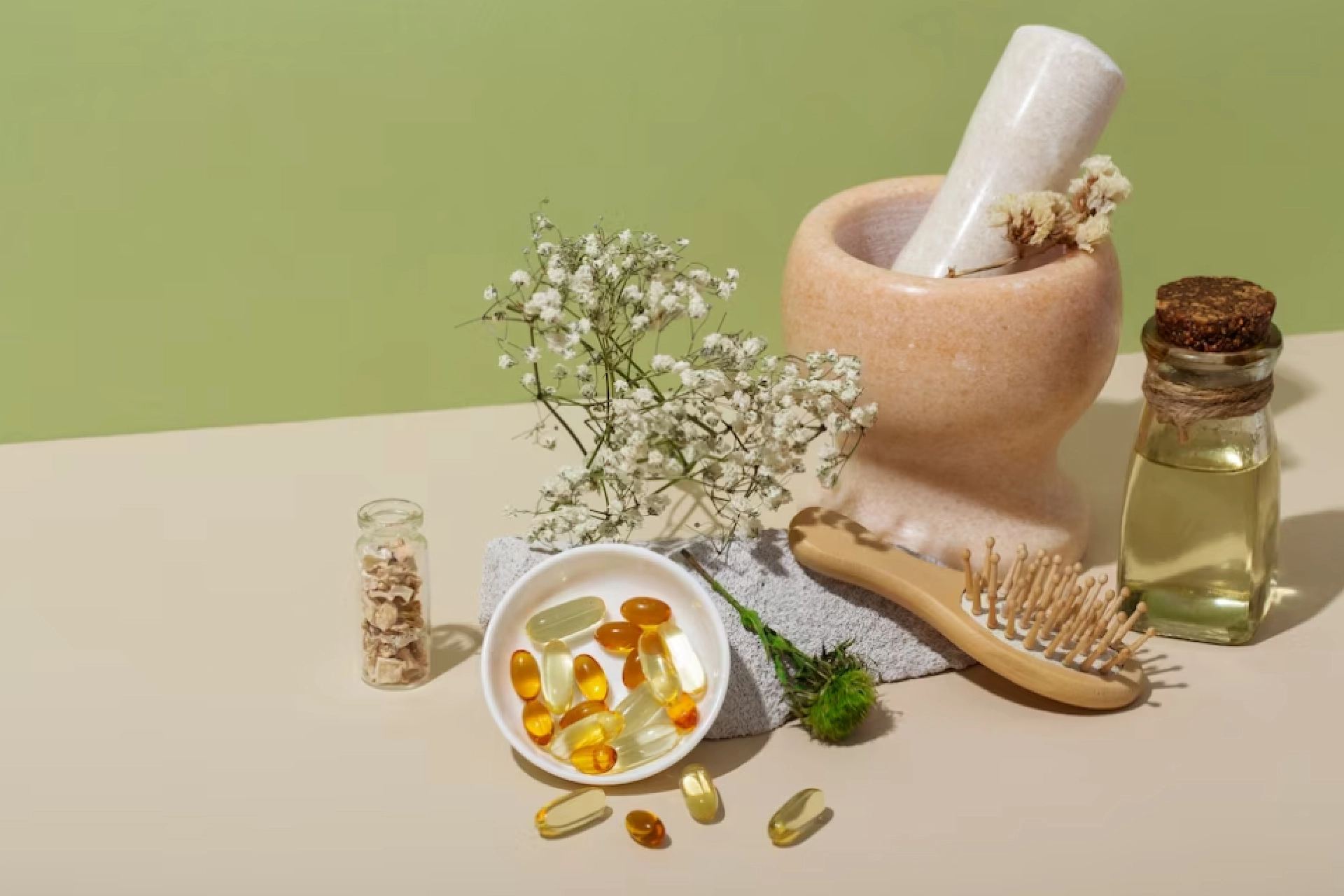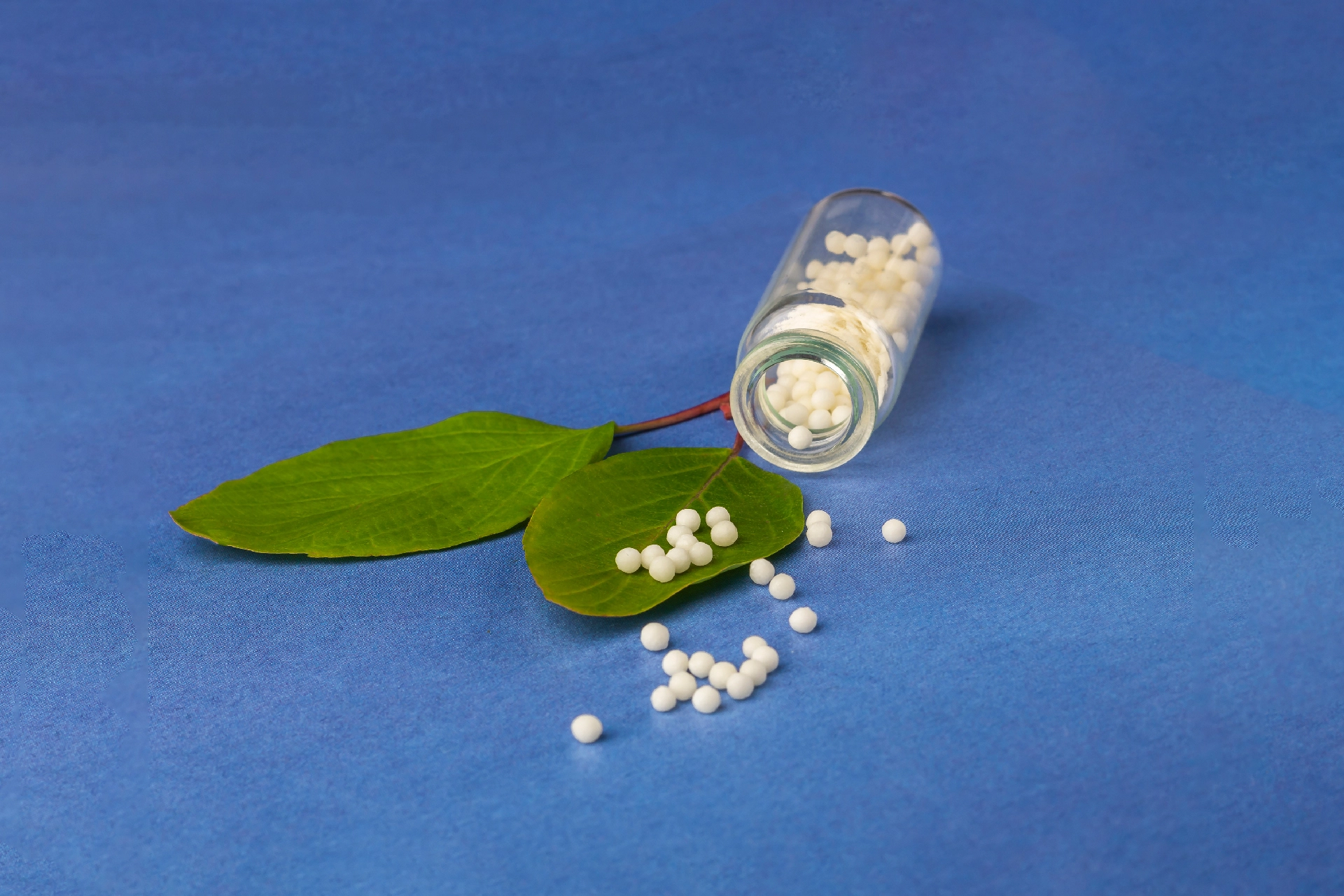Homeopath | 8 min read
Arnica: Overview, Benefits, Uses, and Side Effects
Medically reviewed by
Table of Content
Synopsis
Arnica, a homeopathic herb, has been used as a treatment in many forms, such as gel, ointment, and oral usage.
Key Takeaways
- Arnica is a highly poisonous herb that must be substantially diluted before being used as a homeopathic herb
- Arnica helps treat muscle aches, bruises, and acne
- Despite being advantageous, Arnica can have adverse effects on some people
Arnica (Arnica montana), one kind of perennial herb blossoming in North America, Europe, and East Asia, is a bright yellow plant with a daisy-like look. It is also referred to as leopard's bane, mountain Arnica, mountain tobacco, and wolf's bane. Arnica benefits the body in multiple ways and this herbal remedy is used homeopathically to treat bruises, aches, and pains. It is a plant in the Asteraceae family that has anti-inflammatory properties. Arnica benefits to health in different ways.
Helenalin is the name of the anti-inflammation component of Arnica. Consuming this substance makes it highly toxic. Moreover, if it is not diluted, it can irritate the skin. Since ancient times, homeopathic Arnica, which is a highly diluted version, has been used as an alternative medicine to treat muscular and joint pain, bruising, infections, and hair loss.
Arnica: Plant Description
The Arnica plant has yellow-orange flowers like daisies and is a perennial that reaches a height of 1 to 2 feet. Round, hairy stems have one to three flower stalks at the end, each with flowers that measure two to three inches across. The leaves are a brilliant green. Lower leaves have rounded tips, whilst top leaves are toothed and slightly hairy. It is grown in North America but is native to the highlands of Europe and Siberia.
Arnica: History
Because of the various Arnica benefits, it's flowering heads have been used medicinally for hundreds of years in both internal and exterior treatments. It was widely used in European folk medicine [1], and early North American settlers made alcoholic tinctures of the herb to cure sore throats, as a febrifuge, and to increase circulation. Analgesic use, surgical or accidental trauma treatment, postoperative thrombophlebitis treatment, and pulmonary emboli treatment are all examples of homeopathic uses. Amongst various Arnica benefits, some of it is used to treat acne, bruises, sprains, and muscle aches externally. Additionally, it has been used as an antibiotic for gunshot wounds and abrasions, a CNS stimulant, and a general topical counterirritant.

Arnica Benefits as a Homeopathic Herb
Homeopathy is a controversial type of alternative medicine first discovered in the 1700s by Samuel Hahnemann [2]. Homeopathy encourages healing by giving out incredibly diluted plants and other substances.
In the end, the majority of homeopathic preparations contain very little Arnica. So, Arnica benefits as a Homeopathic herb is considered harmless despite being toxic due to its high dilution.
Arnica Benefits on Health
Homeopathic Arnica has various benefits. Some of the Arnica benefits are as follows:
Could Reduce Inflammation and Pain
It is a substance used in homeopathy to treat swelling, pain, and inflammation of the tissues. It produced results that were comparable to those of allopathic anti-inflammatory medications such as diclofenac and ibuprofen.
You can apply Arnica creams and gels topically to treat various skin conditions, including tendinitis, stiffness, fibromyalgia, and acute muscle pain.
It is a potential substitute for non-steroidal anti-inflammatory medicines because of its clinical effectiveness in reducing pain and inflammation.
There is little but compelling scientific data supporting Arnica's beneficial benefits on pain, numbness, acute back pain, headache, hemorrhoids, etc., that are caused by cellulitis. It is also considered a possible acne homeopathic remedy.
May Aid in the Management of Rheumatoid and Osteoarthritis
Osteoarthritis (OA) is a condition that affects the joints in your knees, hips, and hands. Usually, the bone grows to heal the damage caused when joints lose cartilage. Osteoarthritis develops when the bone grows unnaturally and interferes with regular physical function rather than regenerating.
According to a study on 174 patients with hand osteoarthritis, using Arnica extract gel produced effects similar to those of ibuprofen therapy. Even though side effects were noted, this herbal remedy reduced discomfort and enhanced function.
Compared to the Non-Steroidal Anti-inflammatory Drug (NSAID) equivalent, some individuals experienced greater movement and recovery. It demonstrates that Arnica oil, tincture, and gel are equivalent to ibuprofen. Under physician supervision, they can both be used similarly to treat persistent osteoarthritis.
Could Heal Bruises and Scars
Postoperative bruises and scars may impact an individual's confidence and personality. Blood seeps from damaged blood vessel walls, resulting in these bruises.
Blood that has leaked gathers around the wound or incision, preventing normal blood flow. These wounded areas develop "ecchymosis" (blue, brown, green, or black coloration) due to insufficient oxygen supply.
Patients in a study including rhinoplasty surgeries on the nasal bone received an oral dosage of Arnica during surgery. These patients recovered from surgery more quickly, their ecchymosis healed more quickly, and their bruise colors returned more quickly to normal.
These repeatable observations testify to Arnica's effectiveness in bruise and scar treatment. Its formulations may be used in rhinoplasty and face-lift procedures and to treat deep wounds.
Could Be Useful in Coping with Hair Loss
Women who experience alopecia or severe hair loss may experience depression and lack confidence. With such severe hair loss, aromatherapy might be helpful. Highly concentrated extracts from several plants, including Arnica, are used in the treatment.
These extracts may also stimulate hair follicles when applied topically. It can also be the most secure technique for dealing with various forms of hair loss.
May Lessen Diabetes-Related Eyesight Issues
According to preliminary studies, homeopathic Arnica 5C taken orally for six months improves vision in persons whose diabetes-related visual loss causes complications. It serves as one of the basic homeopathic remedies for diabetes-caused eyesight issues.

Arnica Dose and Directions for Use
Typically, Arnica is consumed or applied to the skin as a fresh plant gel and ointment.
The typical route of homeopathic treatment gets tailored to the patient's specific symptoms.
There are currently no standards for using homeopathic Arnica to treat pain or bruising. Also, most oral homeopathic Arnica medications come in a wide range of doses. The most prevalent ones are C12, C30, and C200, all of which have high dilution levels.
Follow the directions on the label for topical Arnica gels and use only products that have been greatly diluted. Most over-the-counter medicines can be used topically two or three times daily for up to three weeks.
Because pure Arnica can be hazardous to your liver if taken internally, only use diluted homeopathic preparations. Even though there don't seem to be any concerns associated with using homeopathic Arnica, it's still a good idea to talk with your physician before using it.
Available forms
It is available in creams and ointments for external use. The tincture form is the most typical and can also be used as the foundation for compresses and poultices. Topical treatments containing Arnica oil are also available. Several homeopathic treatments can be taken as pills, applied topically, or injected.
Storage
It is best to keep all varieties of Arnica out of direct sunshine in a cold, dry location.
But unlike pharmaceuticals, Arnica products are not subject to the same regulations, so the amounts listed on the package may be inaccurate. Thus, don't use more than is necessary, and consult your healthcare provider before using.
Possible Side Effects
It is a well-known fact that Arnica has adverse effects. It remains true even when used in highly diluted topical creams or ointments. Oral formulations may have more severe Arnica side effects.
Topical Use
It may induce a moderate allergic reaction when used in less-diluted formulations. People who are allergic to plants in the Asteraceae family most frequently experience this. These plants consist of Ragweed, Marigolds, Chrysanthemums, and Daisies.
Blood pressure and heart rate can both rise when Arnica is taken. It is more likely to happen if applied excessively or on damaged skin.
Broken skin can allow more of the active chemical to be absorbed. It might sting if the skin is damaged.
Taken orally
Its homeopathic medicines tend to be quite diluted. These are typically regarded as secure. Helenalin, however, may be present in some forms at detectable levels. Health concerns exist with these forms.
Helenalin can lead to the following when taken orally:
- An irritated mouth and throat
- Stomach pain
- Vomiting
- Shortness of breath
- Easy bruising
- Rapid heartbeat
- High blood pressure
Avoid using oral medications that include only Arnica. Symptoms are more likely to develop from these. Additionally, they can harm the heart and raise the danger of organ failure, coma, and mortality.
Interactions and Contraindications
Theoretically, Arnica might prevent blood clots. Two weeks before surgery, you should stop using all non-homeopathic Arnica. The possibility of postoperative hemorrhage will get decreased.
If you are using blood thinners, keep away from Arnica. Your risk of bleeding and bruising may rise due to the combination.
These medicines and Arnica might not get along:
Heparin, NSAIDs such ibuprofen and naproxen, Coumadin (warfarin), and Plavix (clopidogrel). Avoid using Arnica if you are pregnant or nursing, and see your homeopathy doctor before applying it to your skin. Before taking any drug, including herbal remedies, speak with your doctor first.
Always consult a healthcare professional before using homeopathic Arnica if you're interested. By offering a network of service providers and utilizing cutting-edge technology to enhance consumer health, Bajaj Finserv Health is a health management platform that aims to be an enabler in the healthcare ecosystem. With an immediate online appointment for a doctor consultation, get customized answers for any health concern.
References
- https://www.sciencedirect.com/topics/pharmacology-toxicology-and-pharmaceutical-science/arnica-montana
- https://www.ncbi.nlm.nih.gov/pmc/articles/PMC1676328/
Disclaimer
Please note that this article is solely meant for informational purposes and Bajaj Finserv Health Limited (“BFHL”) does not shoulder any responsibility of the views/advice/information expressed/given by the writer/reviewer/originator. This article should not be considered as a substitute for any medical advice, diagnosis or treatment. Always consult with your trusted physician/qualified healthcare professional to evaluate your medical condition. The above article has been reviewed by a qualified doctor and BFHL is not responsible for any damages for any information or services provided by any third party.





